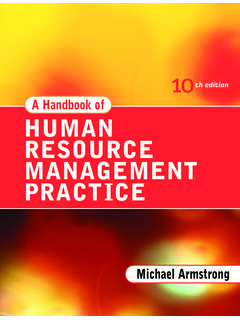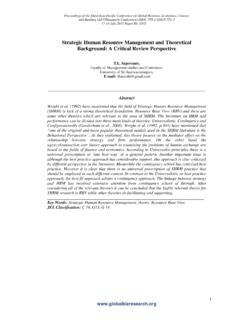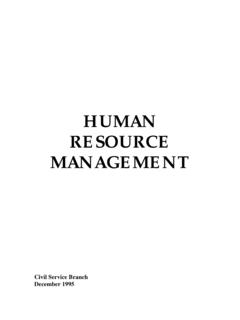Transcription of The Impact of Strategic Human Resource …
1 The Impact of Strategic Human Resource management on organizational performance Luftim CANIA1 ABSTRACT organizational performance is getting more and more important, especially in a market with greater competition and dynamic. organizational performance is measured through different indicators. It guarantees the continuity of the organization to be competitive in a global marketplace. Normally, the implementation of performance indicators achieved through Human resources. Human resources are the key for keeping the organization in the market so competitive. These Human resources need to be managed effectively to achieve the required performance of the organization. It is necessary to manage strategically the Human resources and to adapt at its strategy with organizational strategy. The aim of this study is focused on the Impact of the Strategic management of Human Resource in achieving organizational performance .
2 This study was conducted based on primary and secondary sources. How much organizations appear competitive in the market through achieving the performance indicators? How important is the management of Human resources in achieving organizational performance ? So, through the skills, behaviors and attitudes would be expected by Human resources to achieve the required performance in the organization. KEYWORDS: Strategic HRM, organizational performance , effective management , HR outcomes. JEL CLASSIFICATION: L25, O15, P17 INTRODUCTION Organizations are seeking to create much competition between them, taking more market, more customers, more sales, etc. Rapid changes stemming from globalization, advancement of information systems and other factors have caused higher competition. Many organizations are driven by the market to set their goals in their performance .
3 Some of the goals are: cost reduction, achieving sales levels, increasing the number of customers, increasing the market percentage, improving productivity and quality, innovative products. The realization of these goals will be achieved through the Human resources management in organizations. Workforce, as the key to success, will enable the achievement of organizational performance . Human resources are regarded as one of the most important sources of today's firms. Human resources management is more important than other competitive sources because these people use other assets in organization, create competitiveness and realize firstly, organizations must understand the expectations of their workforce in order to achieve the desired performance . The realization of the expectations of employees will enable the desired behavior of employees in the organization.
4 Some of the 1 , European University of Tirana, Albania, E-mail: Luftim CANIA 374 desired outcomes of the organization in managing their workforce are: competence, cooperation of employees with managers, cooperation of employees between them, showing the capabilities of employees; motivation, commitment and satisfaction; attitude and presence; employee behaviors. The overall goal of performance management is to create a culture as high performance in which individuals and teams to take responsibility for the continuous improvement of business processes and their skills and contribute in achieving the targets set by managers. In particular, management performance can be expressed as the approximation of individual objectives of employees with organizational objectives provided that employees support the culture of the organization.
5 It provides for expectations to be defined and agreed in terms of role responsibilities and accountabilities (expected to do), skills (expected to have) and behaviors (expected to be)(Armstrong, 2006). The purpose of Strategic Human Resource management is to improve business performance through people management . The organizations need to manage their Human resources effectively and efficiently to achieve the desired goals and objectives. The achievement the goals and objectives translate also in better performance . So, the issues raised for discussion are: How should organizations manage their main source Human resources? Does Strategic Human Resource management help to meet the needs, the goals and objectives of the business? As should be adapted Strategic Human Resource management to realize the performance ? How should adapt Strategic management of Human resources to increase organizational performance ?
6 The main objectives of the study are: a. To observe closely how applicable is in practice the theoretical aspect of Strategic Human Resource management for the achievement the organizational performance . b. To observe if organizations use the strategy of Human Resource management for the achievement of their performance objectives. c. To observe the importance of these strategies in the organization and in their performance . 1. LITERATURE REVIEW The achievements of organizational objectives can be different in different organizations. The studies emphasize the Impact of HRM on organizational performance . Basically, and other studies in this area, point out that it is necessary to achieve organizational objectives and management of Human resources should be Strategic . Also, the strategies of Human Resource management should be integrated with the overall organizational strategy in the context of achieving the required performance .
7 There has been much research on Strategic Human Resource management that affects organizational performance . The discussions and definitions will be divided in two parts of speech: the Strategic management of Human resources and organizational performance . Strategic HRM concept Strategic HRM is a process that involves the use of overarching approaches to the development of HR strategies, which are integrated vertically with the business strategy and horizontally with one another. These strategies define intentions and plans related to the overall organizational considerations, such as organizational effectiveness, and to more specific aspects of people management , such as; resourcing, learning and development, reward and employee relations. Strategic HRM focuses on actions that differentiate the firm Economia. Seria management Volume 17, Issue 2, 2014 375 from its competitors (Purcell, 1999).
8 It is suggested by Hendry and Pettigrew (1986) that it has seven meanings: the use of planning; a coherent approach to the design and management of personnel; systems based on an employment policy and workforce strategy; often underpinned by a philosophy ; matching HRM activities and policies to some explicit business strategy; seeing the people of the organization as a Strategic Resource ; achievement of competitive advantage (Armstrong, 2006). Strategic HRM has a clear focus on implementing Strategic change and growing the skill base of the organization to ensure that the organization can compete effectively in the future (Holbeche, 2004). SHRM facilitates the development of a Human capital that meets the requirements of business competitive strategy, so that organizational goals and mission will be achieved (Guest, 1987). Strategy of Human Resource management is an integral part of business strategy.
9 The main focus of this strategy is to achieve organizational objectives. So, strategy, then, is a set of Strategic choices, some of which may be formally planned. It is inevitable that much, if not most, of a firm s strategy emerges in a stream of action over time (Boxall and Purcell, 2003). organizational performance concept Campbell s (1999) theory defines performance as behavior or action relevant to the attainment of an organization s goals that can be scaled, that is, measured. Moreover, job performance is defined as what one is paid to do, or what one should be paid to do. The theory states that the measurement options, be they ratings from a supervisor, peer, or self, a simulated work sample, or hard criteria ( tallying revenue generated, costs saved, customer complaints, or some variant of a computerized performance assessment) besides being valid, reliable, and not deficient should be free of contamination from sources of variation that are not under the control of the individual ( differences in technology impacting a person s performance ).
10 Situational enhancers or constraints, if not taken into account in an appraisal, can contaminate the mean, variance, or both with regard to an individual s performance . Observation and interpretation hold the key to the establishment of effective criteria. Yet, an ongoing problem in appraising people is the lack of reliability in the observation of their behavior (Ronan and Prien 1971). This unreliability is largely attributed to well-known rating errors such as first impressions , halo , and similar-to-me . Lifson (1953) found that up to one-third of performance measurement variance is due to rater differences despite the fact that the observers had considerable experience in observing and evaluating people in the workplace. Lance (1994) corroborated this finding. Experience, however, is not a substitute for training. To solve the problem regarding lack of reliability, an observer must be trained.










